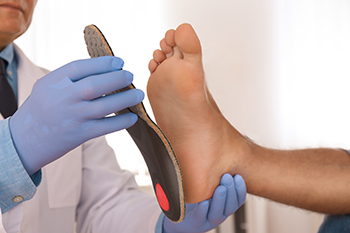
Plantar fasciitis, a common foot condition characterized by inflammation and degeneration of the tissue supporting the sole of the foot, can cause a great deal of pain. Orthotics are known to be helpful in eliminating sharp heel pain, particularly in the morning or after prolonged periods of sitting. The two primary causes associated with plantar fasciitis are muscle imbalance and poor foot biomechanics. The main types of orthotics that can provide much needed support include heel cups or pads, and shoe inserts. Heel cups are small inserts for the back of your shoe that lift the heel slightly. This reduces tension on the Achilles tendon, subsequently easing stress on the plantar fascia. Additionally, the cushioning effect helps to absorb shock. Experts suggest wearing heel cups in both shoes to avoid leg length discrepancies that could lead to further issues in the foot, knee, and back. Shoe inserts provide support beyond the heel. With a deep heel cup and contoured shape, they provide stability and biomechanical support. Half length insoles fit under the heel and arch, leaving the toes free. To find out which type of orthotics for plantar fasciitis is best for you, it is suggested that you schedule an appointment with a podiatrist for an exam and treatment options.
Plantar fasciitis is a common foot condition that is often caused by a strain injury. If you are experiencing heel pain or symptoms of plantar fasciitis, contact one of our podiatrists from Foot Surgery Specialists of Texas. Our doctors can provide the care you need to keep you pain-free and on your feet.
What Is Plantar Fasciitis?
Plantar fasciitis is one of the most common causes of heel pain. The plantar fascia is a ligament that connects your heel to the front of your foot. When this ligament becomes inflamed, plantar fasciitis is the result. If you have plantar fasciitis you will have a stabbing pain that usually occurs with your first steps in the morning. As the day progresses and you walk around more, this pain will start to disappear, but it will return after long periods of standing or sitting.
What Causes Plantar Fasciitis?
- Excessive running
- Having high arches in your feet
- Other foot issues such as flat feet
- Pregnancy (due to the sudden weight gain)
- Being on your feet very often
There are some risk factors that may make you more likely to develop plantar fasciitis compared to others. The condition most commonly affects adults between the ages of 40 and 60. It also tends to affect people who are obese because the extra pounds result in extra stress being placed on the plantar fascia.
Prevention
- Take good care of your feet – Wear shoes that have good arch support and heel cushioning.
- Maintain a healthy weight
- If you are a runner, alternate running with other sports that won’t cause heel pain
There are a variety of treatment options available for plantar fasciitis along with the pain that accompanies it. Additionally, physical therapy is a very important component in the treatment process. It is important that you meet with your podiatrist to determine which treatment option is best for you.
If you have any questions, please feel free to contact our offices located in River Oaks and Sharpstown in Houston, TX . We offer the newest diagnostic and treatment technologies for all your foot care needs.
